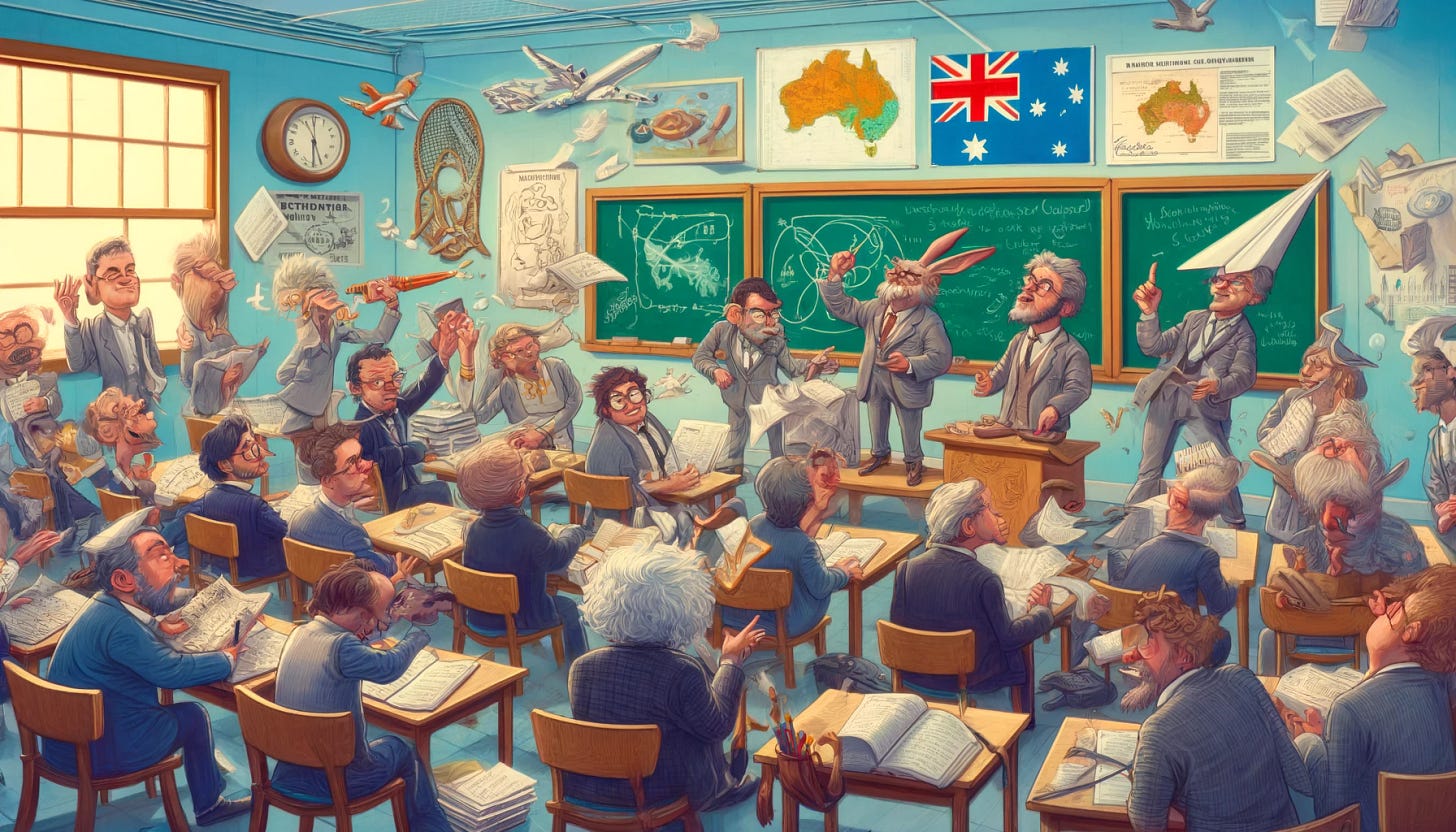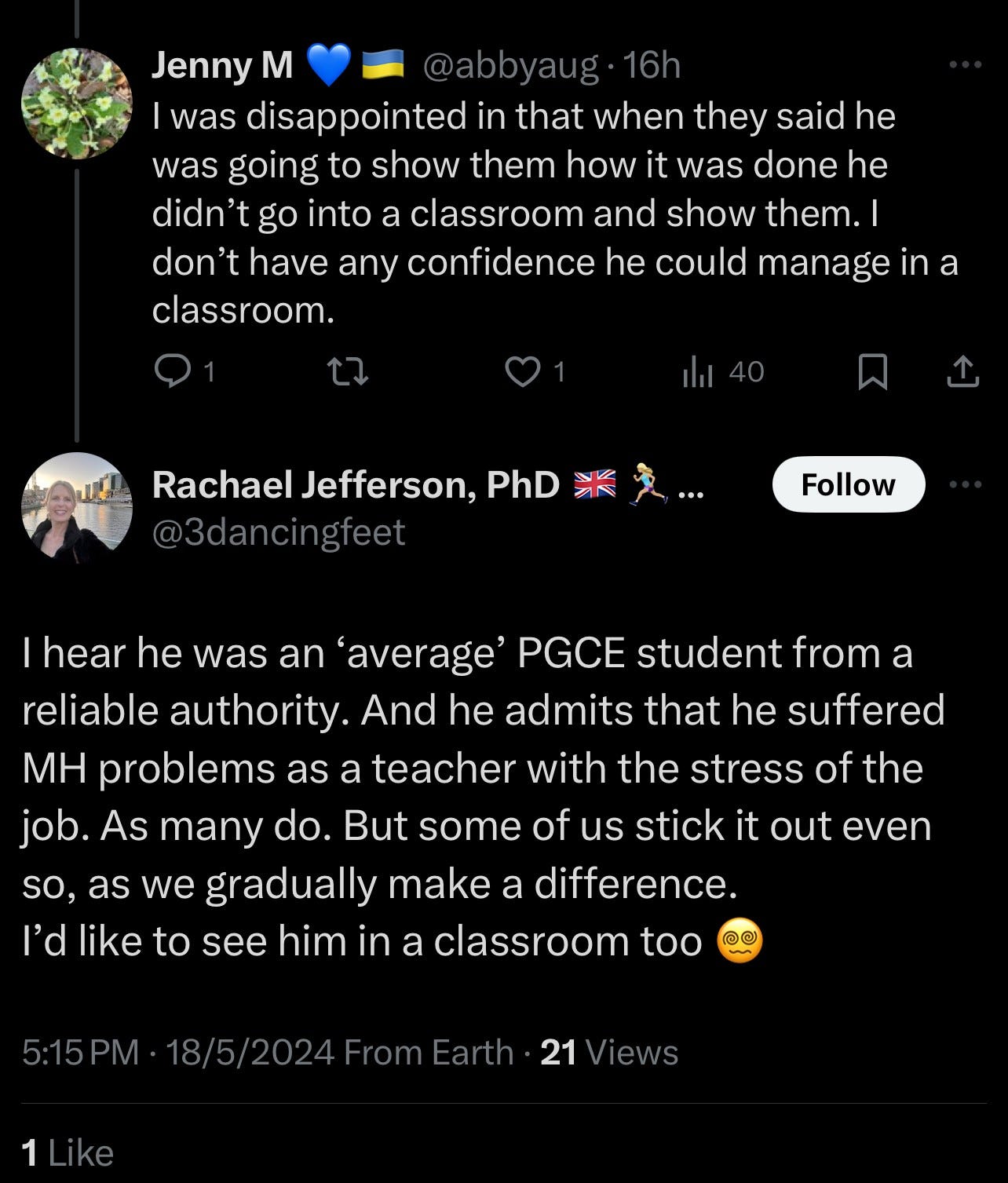Tom Bennett has been in Australia for the last couple of weeks. During that time, he has given talks to hundreds of teachers.
On Monday, he came to my school, Ballarat Clarendon College. In the morning, I showed him around and we visited some classrooms. In the afternoon, he gave a talk to school leaders about a behaviour curriculum and how to ensure their schools were safe, calm and dignified. We invited some local government school leaders along to that. Then, in a twilight session, he spoke to our teachers about ensuring a positive school climate.
As ever, Bennett was witty and engaging. This is probably why he has charmed the Australia media and been given radio, TV and newspaper coverage. If you’ve never seen him speak then this clip from The Project gives a sense of his personality:
One of the comments posted under that clip on Twitter complains of Bennett’s ‘zero tolerance’ approach. This is very strange because, as far as I am aware, Bennett has never advocated for zero tolerance behaviour management. He made this point to our teachers on Monday, saying, “Any rule that does not permit exceptions is cruel. ‘Zero tolerance’ is more of a slogan than a strategy.”
However, this fits a pattern of people criticising entirely imaginary versions of Tom Bennett and what he stands for. Versions they have made up in their own heads.
Another point Bennett stressed to us was that there should be no room for punishment in schools. Punishment connotes revenge, an eye for an eye, getting your own back and so on. It is no way to build relationships. Instead, when the teaching and reinforcement of required behaviours does not work — as it won’t all the time — consequences should be mild and dispassionate, and the clear and inevitable consequence of the behaviour.
Bennett’s focus on classroom and school climate has never been more pertinent in Australia. Many of you will be aware of the way we compare with other countries on the OECD’s index of classroom disruption. It is not favourable. And yesterday, further evidence from the OECD on the prevalence of classroom disruption and bullying in Australia was made available.
Bennett’s expertise stems from visiting hundreds of schools across the world and talking to teachers and school leaders. In 2017, he was commissioned by the UK government to conduct a review, Creating a Culture, that outlined the practices adopted by those schools that tended to be better at managing behaviour. As the title suggests, it is more about creating, teaching and reinforcing a set of norms than about consequences.
This is not the kind of quantitative research that educational psychologists may conduct. However, schools are complex systems and Bennett’s approach works with that complexity. It does not give us direct causal relationships, but what Bennett refers to as a series of good bets. It gives me confidence that Bennett’s findings largely align with more traditional forms of research.
As he has been travelling around Australia, Bennett has been asking teachers about their training and how it prepared them for teaching. On Monday, the consensus among the Clarendon teachers he spoke to was that it had not prepared them very well at all and this is a response Bennett has experienced across Australia. However, when he commented on this on The Project and in other media, he drew a furious response from some in the teacher education sector.
The most reasonable of these responses is that Bennett has not conducted a thorough review of the content and quality of teacher education in Australia and so he cannot know what trainees have been taught. It is true he has conducted no such review and, to my knowledge, nobody has. Should that prevent him from commenting? And why, given the vast number of researchers employed in the teacher training industry, has nobody conducted such research? Well, its findings may be inconvenient.
However, a small group of commentators has been relentlessly sledging Bennett the whole time he has been here and much of that sledging has been entirely unreasonable.
Perhaps the most persistent critic has been Rachael Jefferson, also known for tweeting unconventional views about COVID. According to her bio, Jefferson spent two years teaching in the UK then 13 years as the head of PE at the International School of Geneva before moving into teacher education. In my experience, that is not an atypical track record for someone teaching trainees how to manage a classroom, which perhaps explains a lot.
Among her flurry of Bennett-related Tweets, Jefferson claimed that I am not a researcher — which is an odd statement to make about someone with a PhD. However, she spent most of her energy disparaging Bennett directly, labelling him a #fakeprof.
I am mostly going to avoid the details of what Jefferson has tweeted because it is not worth your time or my time. Some of it is just unpleasant* and unbefitting of anyone involved in education, whether it is of teachers or otherwise. However, one pair of comments is too delicious. The same Jefferson who, at one point, suggests, ‘we do need to focus on studies no older than 10yrs or so,’ also states:
“Once we appoint ourselves as ‘experts’ the classroom is no longer student-centred. It contravenes social constructivism that is at the foundation of teaching principles globally and *is* research led. Vygotsky.”
Remind me when Vygotsky conducted his research? That would be the 1920s-30s.
It is interesting that Jefferson has attracted such support from figures involved in teacher training in the UK and Australia. It is almost as if they are looking for a champion to ride out against Bennett, who they see as a threat to their way of life.
A funny champion, though.
As for Bennett, he is on the big bird back to blighty having wowed the Australian media and gained the respect and support of many classroom teachers. I hope he can return soon.
*It appears this tweet has now been deleted. That’s good. However, as I am not aware of an apology, I have posted a screenshot below. This will be deleted once I do become aware of an apology.








This gives me deja vu. Back when I was an arrogant undergrad student studying to become a teacher, I got into an email argument with one of my education professors. While today I wouldn't stand by everything that I said, I do remember clearly that in the exchange, my professor was highly critical that I had sent him a study from about twenty years previous. He literally said that research older than about 10 years was functionally useless in the field of education. In that exact same email, he mentioned how the principles of our college's teacher education program were based primarily around the work of Vygotsky. In my response, I said (among other things) that Vygotsky died in 1934. This interaction with my professor was around six years ago. These talking points don't seem to die...
I'm 18 months out of a MTeach at a major Vic Uni. Behaviour management was not covered in any meaningful way. I ended up buying, and obsessively studying, "Running the Room" by Bennett to partly make up for this shortfall. I also had the privilege of attending one of his sessions last week. It was grouse and the attacks on Bennett are ill-informed and quixotic.
Teacher Ed seemingly has an issue with groupthink and self-censorship whereby the radically progressive elements of the field of education limit discourse to a narrow set of axioms. e.g. testing is bad, quiet students means no learning, linear desks are oppression, textbooks are radioactive, the Elysian Fields are actually Finland, Freire beat Hercules in an arm-wrestle twice, etc.